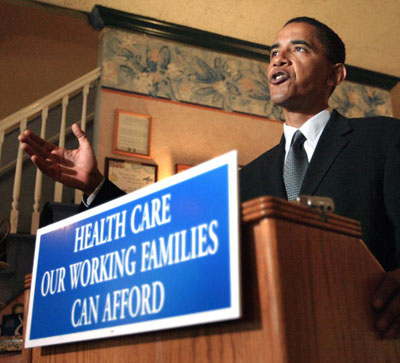
The Lancet, Volume 375, Issue 9721, Page 1135, 3 April 2010
The US health-care reform act became law on March 23, 2010.
Within a decade, this landmark US$940 billion bill will revolutionise how medical care in the USA is delivered.
The big winners of this reform are, of course, those who are currently uninsured. Coverage by 2014 will encompass 32 million uninsured Americans who had previously been too sick or too poor to qualify. By 2019, 95% of the US population will be insured. Although the bill establishes an individual mandate for carrying health insurance, it will not provide universal health-care coverage. It will leave 22 million uninsured, some of whom are illegal residents and ineligible. The rest are young and healthy Americans who prefer to pay the government-imposed penalty for not having insurance.
The health-care bill brings major insurer reform. Almost 67% of insured Americans today receive health coverage through their jobs via private insurers chosen by their employer. Until now, a private insurer could deny coverage because of pre-existing medical conditions, or could impose a lifetime cap on coverage. The new law forces insurers to accept all applicants irrespective of health status. The expansion of coverage will, on the one hand, benefit the private health-insurance industry. On the other hand, Medicare and Medicaid—the government's insurance programmes for elderly people and low-income citizens, which currently cover 28% of US residents—will have a catastrophic additional operational and financial burden for which solutions are not clearly defined within the current bill.
There is no doubt that escalating medical expenditure in the USA (currently US$2·5 trillion a year, accounting for 19% of gross domestic product) needed an urgent fix. But is the health-care reform bill going to control the country's skyrocketing medical costs and also not affect the country's current deficit? Most probably it will further burden the government's budget. The proposed cost-saving options, such as the initiative to pay for quality and not quantity of delivered care (so-called pay-for-performance instead of fee-for-service), as well as the initiative to penalise hospitals for high readmission rates, are very welcome but will probably not reduce health-care costs. Most importantly, the US medical system is currently driven by competition and technological innovation, which is unlikely to change. Although the efficacy of technologies is expected to be managed by comparative-effectiveness research, the current shift in emphasis from blockbuster drugs for all to a culture of personalised medicine will only impose higher costs on the health-care system. Likewise, the American baby-boomer generation is reaching retirement age, which will increase the pool of senior citizens who are heavy health-care consumers and lead to a rise in future health expenditure.
The success of the health-care reform bill will greatly depend on its acceptance by the public. Most Americans remain worried about the increased tax that will be imposed on them to cover the costs of the bill, and are sceptical about the government's right to intrude into the private choices of its citizens. Americans, unlike most Europeans, believe that a basic human right is the freedom to choose, whereas to have health coverage is a reward that should be earned (through work). The Obama administration still needs to convince its citizens that health coverage is a human right and not a privilege. In that respect, the current bill provides a basic minimum of coverage for the poor, while wealthy individuals will still have the option to choose additional coverage.
Bad behavioural habits (smoking, unhealthy eating, lack of exercise) must also be changed at the individual level for the bill's implementation to be successful. But preventive behavioural changes, necessary for the wellbeing of the entire society, are not only the most difficult to bring about but are also those that, if unaddressed, will have a heavy toll on the cost of the country's health care. The bill begins to address this issue, for example, by mandating labelling of food with calorie counts in chain restaurants and vending machines. The burden of success should also fall onto medical academic centres, where education of primary-care physicians must place greater emphasis on routine care and preventive medicine.
The US health-care reform legislation is to be applauded for extending access to health care and for intending to narrow the gap between expenditure and health outcomes. It represents an excellent start in the right direction.
For more on US health reform see http://www.healthreform.gov/.
No hay comentarios.:
Publicar un comentario